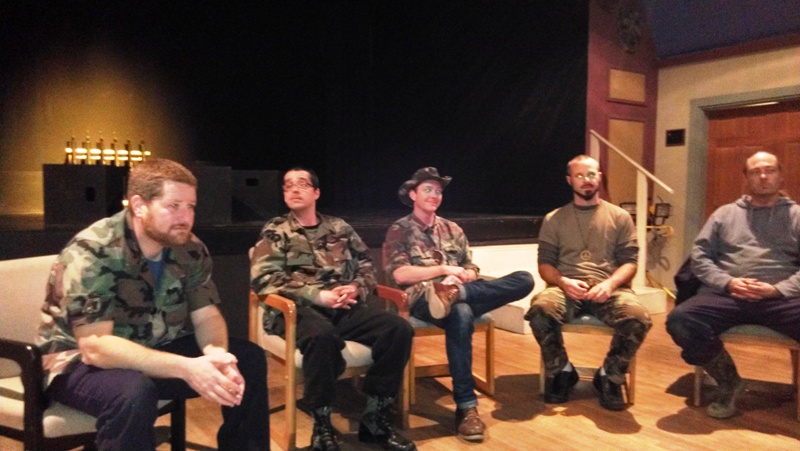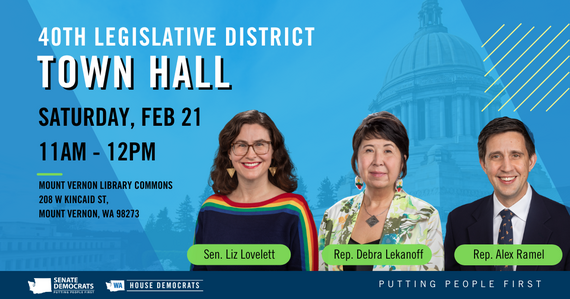
From left: Mike Buckner, Kevin Doyle, Nate Feder, Zak Everly and Philip Shane discuss their parts in Tracers
By Margie Doyle
Somewhere between the establishment and patriotism, political correctness and 9-11 lay Vietnam, the war fought by the generation after the Greatest Generation, the Boomers.
This month, eight young Orcas Island men present that war to Orcas Islanders through the production of Tracers, which will run for two weekends starting this Friday, Nov. 9. First time director Lin McNulty, long an advocate of veterans rights, is directing the drama.
Tracers was conceived by John DiFusco, a Vietnam vet himself who said of his experience, “There’s probably no stronger male bonding than that in the military,” he says, “and no more so there than in combat.”
Upon his return to the U.S., DiFusco ran afoul of the law and was told by a cop that his Vietnam experience “is your problem.” Di Fusco wrote the play in 1980 collaborating with fellow Vietnam veterans, who also performed the premiere production.
McNulty says the play is “a composite or collage of interrelated scenes. It follows the lives of a group of ‘grunts’ as they move from basic training, on to combat in Vietnam, and finally to the shattering realization that their lives will be forever affected by the horrors they have witnessed.”
Recently Orcas Issues met with these young actors: Mike Buckner, Kevin Doyle, Zak Everly, Nate Feder, Peter Giampietro, Andy Martin, and Philip Shane, to discuss the backstage preparation for those performances; only cast member Jason Dean was absent as the actors talked about war, acting, art, camaraderie and the brotherhood of soldiers.
McNulty was approached by Doug Bechtel, President of The Actors Theater of Orcas Island to read the play. She says that, in the process of recruiting the cast for the play, she probably talked at some point to “every Orcas Island man under 40.” Perhaps her most fruitful recruiting grounds was The Lower Tavern — a poster publicizing tryouts was placed in the men’s restroom there, and McNulty encouraged all who had any interest to come to the first reading.
For their parts, the actors had only minimal, if any, previous acting experience. Nate Feder’s first acting was in “The Butterfly Effect” earlier this year; Mike Buckner was stage manager for a south central Oregon theater some years ago, and Kevin Doyle was a theater major at University of Washington.
McNulty cut her theater teeth writing for the 10 Minute Play Fest, and directing and acting in the plays. She has helped behind the scenes, and assisted Bechtel in directing “When Bullforgs Sing Opera.”
Given her involvement in veteran affairs, Bechtel knew McNulty would be the best person to mount this drama. She herself served for 10 years in the Army Reserves in Tumwater, Wash. She enlisted in 1974 with no thought of active duty, but thought it would be “something fun to do on weekends.” She trained at Fort Polk, Louisiana and attended Drill Sergeant school.
Philip Shane is the only cast member who’s served in the military, also for over a decade as a Huey helicopter mechanic in the National Guard. After training at Fort Knox, Kentucky, he served in Idaho and at Fort Lewis, Wash. (Now Joint Base Lewis/McChord). Remembering his own military training, Philip said he considers it a privilege to be asked to be drill sergeant in Tracers. He recall that his own “Drill” left an indelible impression: “You can’t go through military training without respecting your drill,” he says.
Although as a group they have limited first-hand military experiences, the Tracers cast has definite opinions on the military and war.
Mike Buckner recalls the first Persian Gulf War in 1991 and wondering if there would be a military draft. He also remembers his dad’s comments that that war was “nothing” like Vietnam, particularly in its duration. To prepare for Tracers, the group researched and studied the war on their own, and together. They watched the award-winning documentary about post-traumatic stress, The Welcome and also participated in a “sweat” spiritual practice together.
In contrast to World War II and the Korean War, Vietnam was the first televised war – and they say flatly, the first war we lost. It came at a time when drug use, race riots and feminist protests were roiling the social waters at home.
Although many cast members grew up with military relatives, they resisted military recruiting because they didn’t appreciate the idea of authority figures “hovering over us for years” and “realized our options.”
They answer the claim that the military is one of the most effective functions of U.S. government, because “They fund it well,” even as they object to the disparity between soldiers, officers and private contractors in war areas.
After 40 years of televised war news coverage and peace movements, the actors feel that people are “not necessarily as blind as they were” to war’s realities.
They do feel that through the challenges of learning their parts, they have an increased appreciation for what those who serve in the military go through.
From daunting memorization of lines to stage jitters and intense focus, the group faces down their challenges. McNulty says, “I couldn’t be prouder of my rookie cast.”
Andy Martin talks about developing “consistency” in his role, and tapping into difficult emotions. Zak Everly, who wears a peace symbol given to him for his role by a soldier who wore it around his neck every day in Vietnam, says he also feels an obligation to “put myself in the mindset of what kids in our peer group were put into back then; to conceptualize what sort of feelings you’d have ”
Kevin Doyle says he’s tried to “let all else dissolve and hold on to the material with a sense of knowing where we’re going.”
Nate Feder says he’s connected with his character even though he’s “foreign to my personal experience and difficult to research.” Feder also says that having worked behind the scenes in lighting, he imagines how the actors look to the audience. He is mindful of the aesthetic component transcending that “fourth wall.”
All the actors say they feel a real connection with their characters. McNulty says they were definitely not type-cast: “I didn’t assign roles, and a couple of the actors traded roles before they began reading the second act at the first reading of the play.”
Now they say that there is a definite camaraderie in striving for one goal. They have impromptu gatherings where they rehearse, in addition to the four nights-weekly rehearsals at the Grange.
“I’m glad you brought me in,” one says to McNulty. “You had me at corned beef.”
They will long remember some of their favorite lines from the play:
“I’m talking peaches and poundcake motherf******.”
“At times I get taken for Jewish, though.”
“I will fight no more forever.”
“Maggot, you are a hippie.”
“We’re just going out to set up for the Bob Hope Show.”
“Number one sik lu girls.”
“I was happening then; it was a party.”
Tracers runs from November 9th through November 18th. Veterans are admitted free on Veterans Day. Tracers will run Friday, Saturday, and Sunday; all performances are 7:30 pm at the Grange. Tickets are $10 and are available at Darvills Bookstore, on-line at brownpapertickets.com, and at the door. For additional information, contact Director Lin McNulty at 376-1003. VETERANS ARE ADMITTED FOR FREE ON VETERANS DAY, SUNDAY NOVEMBER 11.
This play contains strong language and may not be suitable for pre-teens and those easily offended.
**If you are reading theOrcasonian for free, thank your fellow islanders. If you would like to support theOrcasonian CLICK HERE to set your modestly-priced, voluntary subscription. Otherwise, no worries; we’re happy to share with you.**








Great review-before-the-fact, Margie. You’ve made me want to see the play!
I have known Lin McNulty going on 50 years! Wow! She is passionate about Veteran’s rights, as we all should be. I have no doubt her heart and soul is in this production. I wish I could see it. I am happy to have had the chance to read this article! Life-time friend, Linda T (wife of a Veteran)